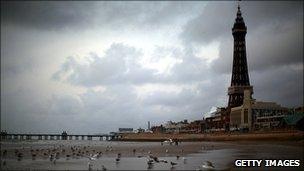Lancashire councils face 'tough' calls on cuts
- Published

Blackpool Council faces "extremely tough decisions", said the leader
Politicians and business leaders across Lancashire have adopted a "wait and see" approach to the Spending Review.
A 7.1% reduction in council funding was among the spending cuts unveiled by the Chancellor George Osborne - the biggest since World War II.
Peter Callow, leader of the Tory-run Blackpool Council, said it now faced "extremely tough and very difficult decisions".
But he said the full effect on services would not be known until December.
Up to 500,000 public sector jobs across the UK could go by 2014-15 as a result of the cuts programme, according to the Office for Budgetary Responsibility.
Mr Callow said the authority had been preparing for this by encouraging significant investment in the private sector to help create new jobs.
"For example our investments in the Winter Gardens, Pleasure Beach, Tower and Sandcastle are all helping to create more quality jobs for local people," he said.
"In terms of what the spending review means for the council, our service users and our employees this is not an overnight process.
"But it is clear now that it is going to be extremely tough with very difficult decisions to be made."
East Lancashire was one of the areas predicted to be hit hardest by the cuts, but Brian Davidson, CEO of Darwen employer Crown Paints, said they would have to wait and see what the effect would be on his workers.
Mr Davidson, who employs about 550 people in Darwen, said: "We have to get our sleeves rolled up and get on with it."
Asked whether the cuts would have a direct effect on the factory, he said: "We don't want to try and have any impact on any of our staff. We can never say never, but we do try and work with everyone.
"We are a bit concerned in terms of local infrastructure, local services, but until we understand what is happening at a local basis we just have to wait and see."
Within the chancellor's statement was confirmation that ring-fenced grants would end in April 2011, which Burnley Council said could have an impact on some of its projects.
Charlie Briggs, the Liberal Democrat leader, said: "It may be that the exact effect on Burnley will be significantly different than the general picture across local government.
"We are continuing our discussions with government departments to set out the issues that Burnley faces."
The authority is currently consulting its staff on plans to axe about 90 jobs - 15% of the work force - as part of efforts to save £2m.
At county level, the end of ring-fenced grants was welcomed by the Conservative-run authority.
Lancashire County Council leader Geoff Driver said it would give them more choice in how to focus resources, although he admitted the reduction in overall funding would have a "major impact" on services.
"We are committed to reducing our back-office costs while protecting services for the most vulnerable and will look initially at saving money from our non-essential activities," said Mr Driver.
"More than half of our funding comes from government grant and undoubtedly we are going to have to be much leaner and fitter as a council to deliver our services."
Mr Osborne did have some good news for Lancashire when he revealed that the £100m upgrade of rail lines between Liverpool Lime Street, Manchester, Preston and Blackpool had been approved.
It will mean faster journey times for rail passengers.
- Published20 October 2010